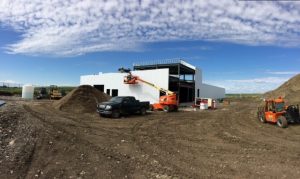As hundreds of applicants across Alberta try to score storefront cannabis licences, a smaller number are hoping to become pioneers in the production industry.
Randy Karren feels his company – Joi Botanicals – will be able to easily compete with the big name Canadian growers such as Aurora Cannabis and Canopy Growth.
While Aurora is working on a 1.2 million square foot facility in Medicine Hat, Karren’s focus is on a smaller, 15,000 square-foot facility just outside Calgary city limits, in the MD of Wheatland County.
He’s not worried about being squeezed out of the market by the big operators.

“There is room for a large volume of what you would call niche market,” said Karren.
He compared it to the rush of smaller breweries that have opened in the past decade. He sees them making a go of it, and he knows Joi Botanicals will be able to do the same.
His projected output is somewhere between 750,000 and 1 million grams per year.
According to Karren, Joi’s overhead costs will mainly be in direct labour costs – Paying workers to tend the plants. He has plans to hire 20 to 30 people once his operation is up and running, and to make those jobs steady, rather than having peaks and valleys of employment like some agricultural operations.
He said large operations like Aurora also come with large head offices, and more overhead costs, which will make his operation competitive.
“If you look at the cost per gram to produce the product, I should think we’d be more than competitive than any major corporation,” he said.
Nor is he worried about being able to sell product to the province. Karren said he has assurance that the AGLC will be looking to buy local.
“The province has been very clear with us that when we have our permit, they will definitely be contacting us. They have indicated they will support local, they will buy local,” said Karren.
AGLC spokeswoman Heather Holmen said for now they’re taking what they can find that’s available on the market, but buying local is something they will be looking to do.
“For AGLC and the government of Alberta – we’re very much interested in supporting local producers and stimulating the economy locally in terms of making sure Alberta producers are represented in the markets for which they produce,” she said.
The AGLC announced its first 13 suppliers in anticipation the Oct. 17 lifting of cannabis prohibition. All except one are from outside the province.
Holmen said the rush was on to be ready for the launch date, and they had to work with people who were already licensed to sell.
“Our priority is to make sure we have licensed producers in place,” she said.
Karren is still working through that regulatory process with the federal government. He said he first has to show that his facility is up to standards for growing and securing the crop. That will get Joi Botanicals a licence to cultivate.
Test crops then have to be scrutinized, before they will get another licence to sell to distributors.
It’s the heavy regulation that spurred Karren to build a new facility rather than trying to refurbish an existing warehouse.
“If you go into an existing building and you try to upgrade it, you run into all sorts of issues,” he said. “Can you really upgrade it to the point where Health Canada is happy?”
Joi Bottanical’s build includes a specialized HVAC system that draws much more power than the average warehouse.
The equipment will grow cannabis in soil, rather than hydroponically. The system will include automatic watering and climate control.
Karren said the building is nearing completion.
“It’s all dependent on the government – we’re now in the final assessment – we believe – our building will be done in August – we believe it will be able to get a license to cultivate by the end of the year, optimistically.
Once they’re up and running, they’ll have two options to sell their product. One will be online directly to medical users who have a prescription. The other option will be to sell to the AGLC. He won’t be able to sell directly to storefronts, but he has partnered with a retail operation – mainly for the data.
The dispensary is probably the only way a major licensed producer has to hear from the customer,” said Karren. “Other than that you’re selling online to the AGLC or online to a prescription holder.”
It’s been a long road. Karren embarked on the journey to grow cannabis three and a half years ago – long before Trudeau’s pledge to legalize the drug.
His decision to take a risk in the medical cannabis industry could pay off in spades due to good timing.
“Trudeau during the election pledged to have recreational marijuana, but I don’t think anyone believed he would put it through,” he said with a laugh.


